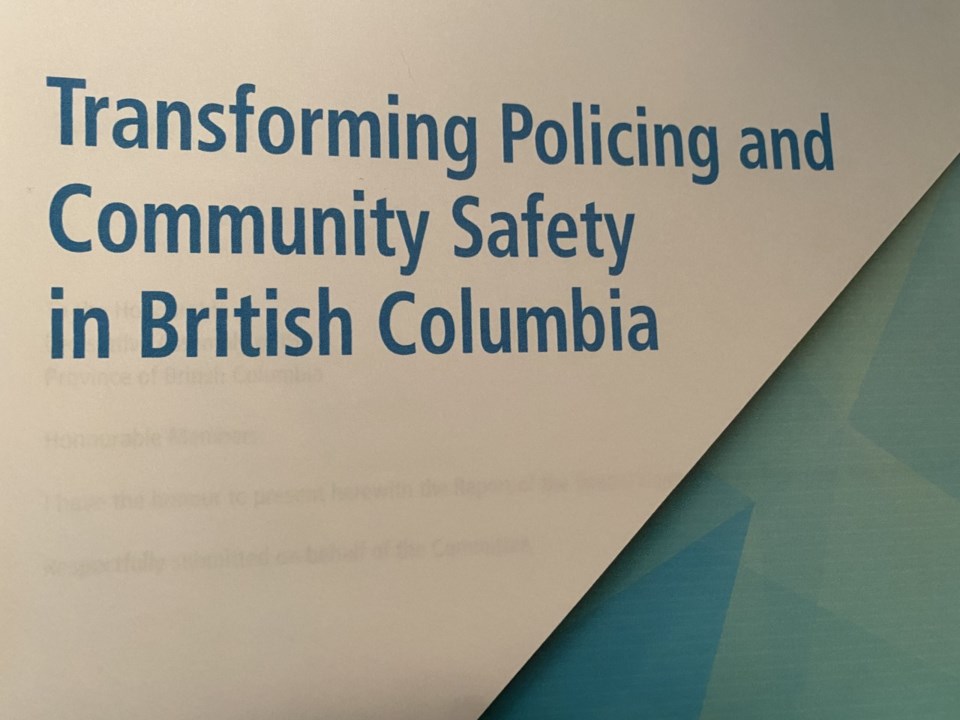The New Westminster Police Department has yet to formalize plans for addressing possible changes to policing in British Columbia.
In April, the Special Committee on Reforming the Police Act presented the provincial government with its Transforming Policing and Community Safety in British Columbia report. The special committee’s role included: considering reforms related to police oversight, transparency, governance, structure, service delivery, standards, funding, training and edition; examining the role of police with respect to complex social issues; examining the scope of systemic racism within B.C.’s policing agencies; and ensuring consistency of a modernized Police Act with the United Nations Declaration on the Rights of Indigenous Peoples (UNDRIP).
Mayor Jonathan Cote, chair of the police board, said the special committee developed a comprehensive report that covers a lot of different areas. He suggested the NWPD should report back to the police board in the fall about the work that needs to be done locally in response to the committee’s recommendations.
“I know it’s a report that is still very fresh, and obviously we need to take our time too,” he said. “Obviously a lot of components of the report aren’t going to be directly under our jurisdiction but some elements very much will be. So I think it would be really helpful for the board to, later in the year, get a good report and engage in that discussion.”
Chief Const. Dave Jansen said he’s hoping to combine the committee’s work with an organizational review of the police department that’s underway.
“What I want to look at doing is, once we get a feeling for where we are going with our organizational review – that’s going to be coming in the next month or so, at least a rough draft – is then building out a work plan that encompasses both that work and the work that is going to come out of the provincial review,” he told the board May 17. “As you know, some of that’s going to be provincial work.”
According to the report, 411 individuals and organizations made submissions and presentations to the committee and 1,432 individuals responded to a survey. (The City of New Westminster provided a submission that focused on the need to address the root causes of crime.)
Jansen said the work plan will consider items that the NWPD needs to start working on, such as initiatives related to mental health and the Peer Assisted Crisis Team pilot project in New West.
Jansen anticipates that longer term work will consider issues such as the regionalization of policing or the formation of a provincial force. He said no conversations have yet taken place with Police Services (part of B.C.’s ministry of public safety and solicitor general) about its plans.
What’s being recommended?
The special committee made 11 key recommendations, including:
* Implement a new Community Safety and Policing Act to govern the provision of policing and public safety services based on values of decolonization, anti-racism, community and accountability.
* Transition to a new B.C. provincial police service that is governed by the new Community Safety and Policing Act. This includes establishing a governance model, such as municipal or regional police boards or committees that are representative of the community and provide opportunities for local input on policing and public safety priories. While municipal councils would have representatives on these boards or committees, the mayor would not be allowed to serve as board chair.
* Ensure all Indigenous communities have direct input into their police service structure and governance.
* Create and appropriately fund a continuum of response to mental health, addictions and other complex social issues, with a focus on prevention and community-led responses and ensuring appropriate first response. This includes increasing coordination and integration across police, health, mental health and social services, and integrating mental health within 911 call options.
* Ensure equitable access to high-quality police and public services across B.C. This includes implementing and enforcing provincial standards, policies and expectations for services with respect to responding to individuals experiencing a mental health crisis, conducting wellness checks, responding to sexual assaults and conducting trauma-informed interviews.
* Create a fair and equitable shared funding model for municipalities.
* Enhance and standardize initial and ongoing police education and training to reflect key values and competencies in order to shift police culture. This includes ensuring police and public safety services are representative of the diversity of communities served, including diversity of race, ethnicity, gender and sexuality, via recruitment. It also recommends regular psychological assessments for all police officers in B.C.; training with respect to anti-racism, cultural competency and trauma-informed practices; and training and education that’s based on the historical, cultural and socio-economic context of the community in which they serve.
* Require police services to collect and publicly report disaggregated race-based and other demographic data and conduct comprehensive reviews of and amend policies and procedure to address systemic racism in policing.
* Establish a single, independent, civilian-led oversight agency responsible for overseeing conduct, complaints, investigations and disciplinary matters for all police and public safety personnel with powers or authority under the new Community Safety and Policing Act.
The Special Committee on Reforming the Police Act also recommended that B.C.’s legislative assembly immediately appoint an all-party parliamentary committee to undertake a broad review of the Mental Health Act with a view to modernizing the Act and ensuring it aligns with recommendations in the report. It also recommended the establishment of an all-party select standing committee on policing and community safety.
Follow Theresa McManus on Twitter @TheresaMcManus
Email [email protected]



